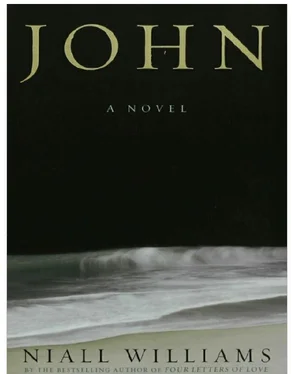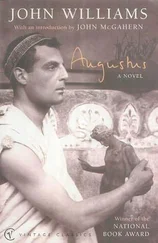On his knees by the side of Papias it suffuses him. He feels it like a course of water coming, sluicing from gates unlocked. It roars into the very blood of him, his ancient arteries quickened, laved. Love. Love. His eyes weep. He draws his hands together. The knuckles whiten in fierce clasp. Love. What comes pouring, flowing to every end of him is the awareness of love. And within it sorrow. Here flows and intermingles the sorrows of failed love, of untold love, of love afraid and perishing, of love twisted by pride, made silent, destroyed. He loves Papias, as he loves Ioseph, as he did Prochorus, but feels he has failed all. He weeps, his shoulders shudder. Ioseph kneels down at the Apostle's side, as do others of the elder disciples. The wind whirls in the little dwelling, the day breaking with little light. Still John is bowed, his heart inundated. We are nothing lest we love. We are of God, who is love. Therefore let us.
The thoughts course, swollen with feeling, carrying in bright effluvium flotsam of phrases, things he might say. Antique channels of him open, wildly irrigated and overflowing. Comes the vivid recall of the love he felt for Jesus, the absolute, the unconditional. This is light and water both. Flowing, flowing, and he a vessel. Love. How a man might be filled and overfilled and feel the radiance of all creation to be the radiance of love, the daylight itself awash, dazed, deluged. How he might be humbled so to feel himself connected to the everlasting, the infinite flood of love, the bounty therein. And feel himself taken, carried, helpless but hopeful, full, filled. A man filled, light-filled, touched like the wick of a candle with flame so he trembles. Love. And knows a bliss of gratitude, an ecstasy of soul to witness himself so capable of such light, such water. Water of life itself. We are nothing lest we love. We are of God, who is love. Therefore let us.
John's frame is bent over, his brows knitted, his white hair a gleam waterfall over the prone figure of the youth. He is other than himself. Not yet is he thinking of what happened to Papias, of the fire or the woman or what Matthias claims. Not yet is he considering the straying of the community, the meaning of what happened, or what must follow. For he is breathed into with spirit, in-spired and at one with what was from the beginning.
At the fifth hour Papias opens his eyes. He lies still. He sees the host of elders gathered around and wonders if he attends his own funeral. Does his spirit float free? The faces are grave, heavy-featured, the room dimly shadowed. There is a noise like the sea that is not the sea. Has he drowned? Has his body drowned and he been thrown up on the shore to be laid out before burial? The waves whisper.
The elders move their mouths. Papias falls back beneath the sea.
The pain in the eye is exquisite. It shoots in from the corner, needling deeper than the needle with the slightest movement of the head. Matthias's vision is smeared as with ointment. The pain pierces. He would shriek if it were not for the others. Baltsaros dabs at it, then lays a poultice he has prepared. It stings fiercely. Matthias feels holed into the back of his mind.
But it was worth it. How they look upon me now. Pain is proof. How the ignorant love suffering in another.
He lies with his back rested against a goatskin cushion of lambswool. (Who of them harbours such a thing?) Linus points Phineas to the reddened knees, but Matthias waves him away, a movement that causes a wince, as though a hook embeds in the jelly of his eye. He sips the thinned winter-berry wine, its sourness recalling him from the hurt. There are figs; there is a bowl of raisins swollen in honey. There are dried pieces of goat meat.
Such dreary offerings. My disciples.
'Master, you saw the devil?' Auster asks, kneeling, his plump face pale and his eyes watering like one fevered.
'The devil had taken the youth; I had to pursue him,' Matthias says.
'He was a serpent?'
'He was serpent in form, but greater than a serpent. He twisted in the youth's eyes, two-headed.' Matthias pauses. They want more. They hunger for detail. Struggling against weariness and the pain, he continues. 'He had taken possession of the spirit, and he rose out and up above me, in size enormous, as to sink his venom in me.'
There is a hush. His twelve, and Auster and Linus attend. He sips the sour wine.
'I called to him to be gone. I opened my arms wide like so, and in my hands were swords of silver. Light shone from them and lit the room and dazzled the devil, but he twisted upon himself and spat and became then a creature breathing fire. "Be gone," I cried out. "Be gone. You know not who I am." The fire he breathed burned me not. I was as one bathed in light divine and he cowered back. One head sucked at the youth for the last of his spirit, the other spat skyward, and a flock of birds it seemed fell from the sky slain. I raised my sword and plunged it to him. It sunk into the hardened scale as though in hide. Black blood of him, hot, flowed. Verily it did. He was wounded, and my sword plunged again and again till he twisted back from me and the youth and departed into darkness.'
Matthias allows a pause. None speaks. The pain in the eye pulses from the telling. He touches the poultice, tries to mask the shudder that passes through him.
'Papias?' Baltsaros asks. 'He was dead?'
'The youth was dead. Auster saw. But his spirit was not taken. It hovered still between this world and the next.'
There is nodding. There is a murmur. There is reverence.
'I knelt then,' Matthias tells them. 'I knelt then to pray that I might be able to intercede on the youth's behalf, that he not leave this world yet. That he be spared to me and returned from death. I summoned the Divine, and found it within me, and touched Papias's forehead, and behold! he lived again.'
There is a gasp. Matthias bows his head. The others do the same.
Wonderful. The power of a story to the credulous.
When Papias wakes a second time, he sees the face of the Apostle. John is bent low over him and must feel the moment, for he turns his head at once.
'Papias?'
'Master.'
'Praise God.' The Apostle reaches his two hands to lay them on the forehead of the youth. The fever is gone.
'Can you hear, Papias?' Ioseph asks.
Tenderly the youth touches his ruined ear, as if his fingers recollect, he nods. 'Yes.'
'Come, we will bear you to the cave,' John says.
'Master, I can walk.'
'You will be weak, Papias,' Ioseph counsels, 'let them bring a litter.'
'No. I will walk. And guide my master. Please.'
And so Papias stands and seems at once to the elder disciples as though he has aged greatly. There is in his bearing the prudent air of one who has come through peril, as if a traveller from lands of plague and famine. He is slow and deliberate where once sudden. He offers his arm to the Apostle. 'Master?'
They go out into the day. Though the storm has moved to the west, the sky is overhung with clouds and the light poor. The disciples progress silently from the dwelling across the smooth rock face polished with wind. The slain seabirds lie where they fell, but none make comment. The dark sea throws itself about, unsettled yet. On the stone steps Papias takes care to attend the Apostle, offering both hands. Wind whirls the white hair and beard. The elders stop and wait. They do not voice opinion on what Matthias seems to have brought to pass; they will wait to hear the word from the Apostle. They have the reverence of ones aware they are in a presence, and though each feels turn inside him the tireless wheel of human questioning, they keep silence. Something is happening, and has happened, but it is not for them to know yet, they believe. All will be revealed. Their faith now is founded as before on the telling of the acts of Jesus the Christ, the Son of God, and the Apostle is as a roadway leading back to that reality and onwards to the Second Coming. He will tell them when he has considered it. He will tell them if Matthias has worked a miracle.
Читать дальше










